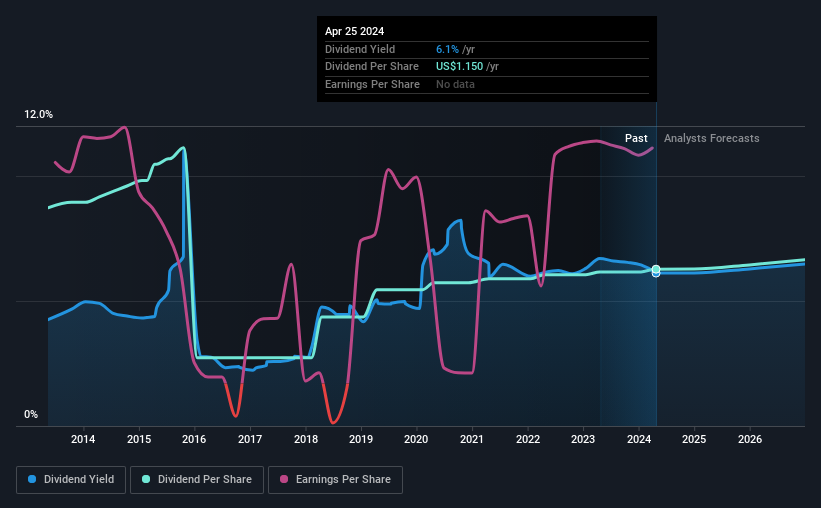Stock Analysis
- United States
- /
- Oil and Gas
- /
- NYSE:KMI
We Wouldn't Be Too Quick To Buy Kinder Morgan, Inc. (NYSE:KMI) Before It Goes Ex-Dividend

Some investors rely on dividends for growing their wealth, and if you're one of those dividend sleuths, you might be intrigued to know that Kinder Morgan, Inc. (NYSE:KMI) is about to go ex-dividend in just two days. Typically, the ex-dividend date is one business day before the record date which is the date on which a company determines the shareholders eligible to receive a dividend. The ex-dividend date is of consequence because whenever a stock is bought or sold, the trade takes at least two business day to settle. This means that investors who purchase Kinder Morgan's shares on or after the 29th of April will not receive the dividend, which will be paid on the 15th of May.
The company's next dividend payment will be US$0.2875 per share, on the back of last year when the company paid a total of US$1.15 to shareholders. Calculating the last year's worth of payments shows that Kinder Morgan has a trailing yield of 6.1% on the current share price of US$18.80. We love seeing companies pay a dividend, but it's also important to be sure that laying the golden eggs isn't going to kill our golden goose! That's why we should always check whether the dividend payments appear sustainable, and if the company is growing.
View our latest analysis for Kinder Morgan
Dividends are typically paid from company earnings. If a company pays more in dividends than it earned in profit, then the dividend could be unsustainable. Last year, Kinder Morgan paid out 103% of its income as dividends, which is above a level that we're comfortable with, especially if the company needs to reinvest in its business. Yet cash flows are even more important than profits for assessing a dividend, so we need to see if the company generated enough cash to pay its distribution. Kinder Morgan paid out more free cash flow than it generated - 124%, to be precise - last year, which we think is concerningly high. We're curious about why the company paid out more cash than it generated last year, since this can be one of the early signs that a dividend may be unsustainable.
Cash is slightly more important than profit from a dividend perspective, but given Kinder Morgan's payments were not well covered by either earnings or cash flow, we are concerned about the sustainability of this dividend.
Click here to see the company's payout ratio, plus analyst estimates of its future dividends.

Have Earnings And Dividends Been Growing?
Businesses with strong growth prospects usually make the best dividend payers, because it's easier to grow dividends when earnings per share are improving. Investors love dividends, so if earnings fall and the dividend is reduced, expect a stock to be sold off heavily at the same time. For this reason, we're glad to see Kinder Morgan's earnings per share have risen 11% per annum over the last five years. We're a bit put out by the fact that Kinder Morgan paid out virtually all of its earnings and cashflow as dividends over the last year. Earnings are growing at a decent clip, so this payout ratio may prove sustainable, but it's not great to see.
The main way most investors will assess a company's dividend prospects is by checking the historical rate of dividend growth. Kinder Morgan has seen its dividend decline 3.2% per annum on average over the past 10 years, which is not great to see. It's unusual to see earnings per share increasing at the same time as dividends per share have been in decline. We'd hope it's because the company is reinvesting heavily in its business, but it could also suggest business is lumpy.
Final Takeaway
Is Kinder Morgan an attractive dividend stock, or better left on the shelf? Earnings per share have been growing, despite the company paying out a concerningly high percentage of its earnings and cashflow. We struggle to see how a company paying out so much of its earnings and cash flow will be able to sustain its dividend in a downturn, or reinvest enough into its business to continue growing earnings without borrowing heavily. With the way things are shaping up from a dividend perspective, we'd be inclined to steer clear of Kinder Morgan.
So if you're still interested in Kinder Morgan despite it's poor dividend qualities, you should be well informed on some of the risks facing this stock. To help with this, we've discovered 3 warning signs for Kinder Morgan (2 are a bit unpleasant!) that you ought to be aware of before buying the shares.
A common investing mistake is buying the first interesting stock you see. Here you can find a full list of high-yield dividend stocks.
Valuation is complex, but we're helping make it simple.
Find out whether Kinder Morgan is potentially over or undervalued by checking out our comprehensive analysis, which includes fair value estimates, risks and warnings, dividends, insider transactions and financial health.
View the Free AnalysisHave feedback on this article? Concerned about the content? Get in touch with us directly. Alternatively, email editorial-team (at) simplywallst.com.
This article by Simply Wall St is general in nature. We provide commentary based on historical data and analyst forecasts only using an unbiased methodology and our articles are not intended to be financial advice. It does not constitute a recommendation to buy or sell any stock, and does not take account of your objectives, or your financial situation. We aim to bring you long-term focused analysis driven by fundamental data. Note that our analysis may not factor in the latest price-sensitive company announcements or qualitative material. Simply Wall St has no position in any stocks mentioned.
About NYSE:KMI
Kinder Morgan
Kinder Morgan, Inc. operates as an energy infrastructure company primarily in North America.
Acceptable track record unattractive dividend payer.

